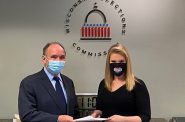Make Lemonade From Trump’s Lemons
However chaotic his style, his team could take on issues like China trade imbalance.
Out of the chaotic stew that makes up Donald Trump’s grey matter, there is hope for change from the status quo to better policies for the country.
For example, it is a good thing that our next president is concerned about job retention in America, expressed in using his bully Twitter pulpit to beat up on Ford, Carrier and Rexnord over moving jobs to Mexico. He’s got one piece of the puzzle in his muzzle.
Now, can his people do the rest? Those companies move to Mexico to stay competitive in a tough global marketplace, primarily to be cost competitive with China. If they can’t compete with Chinese manufacturers on cost, they will lose business and stateside plants will close anyway. Message to Trump. He has to bite off the tougher issue of the Chinese trade imbalance. Mexico is a lesser issue.
In short, it makes only a small dent in the job picture to put three companies in the stocks without dealing with the larger systemic trade issues. Call it a Trumpian blurt, not real trade policy.
As noted before, he could lead by example. He could tweet Ivanka and Melania to bring home the products that they source overseas for their businesses.
For another example of making lemons out of lemonade, his choice of Scott Pruitt, an EPA critic, to head the agency has environmentalists up in arms. But the new secretary could use his good offices to move away from a top-down, prosecutorial approach to regulation to a collaborative model.
What rational, pragmatic regulator would impose new laws and rules on an industry without giving industry executives a seat at the table?
That’s what liberal Sweden has been doing for 50 years, and it works better than a government knows best model.
It goes without saying that our government should set standards for air, water and extraction. But the people working there know a lot more about how to limit pollution than the geniuses inside the beltway.
In short, the Trumpians could move to a green and gold model that enables the environment and economy to move forward together. Those goals do not have to be at odds. Trump’s negotiation skills could come into play.
(My company spent $1.5 million to develop a bio-filter that removes more than 90% of the petro-chemicals that emit from the printing process, and it took six years – yes, six years – for the EPA certify that filter. That’s nuts! It’s the opposite of collaboration, even though Wisconsin government collaborated by funding half of the cost of the new technology.
For another example, Trump’s seat of the pants phone conversation with the president of Taiwan caused a ruckus in Beijing. Some see it as foreign policy chaos.
But our new leader could use the uproar to make a follow-up call to the president of Mainland China to begin a serious dialogue about a whole range of issues that put the U. S. and China at odds. President Nixon went to China. President Trump could, too. (He could stay at Trump Tower in Beijing.)
Those two sectors have become uber-efficient, so they cannot be relied upon as job generators for the future.
Mr. Trump is an entrepreneur of sorts himself, so he should understand the power and virtue of entrepreneurship.
For openers, he could follow Wisconsin’s lead: our state gives investors in high-growth technology ventures a 25% tax credit. How about the same credit on the federal level? It’s working here.
A combined federal-state 50% investor credit would open a floodgate of early stage investment across the land. New high-pay jobs would explode across the economy.
Call all of the above political ju-jitsu. Use the Trumpian chaos as an opening to move to higher ground. The President-elect won’t ever do the serious policy work, but maybe his people will. They have doors ajar to do so.
John Torinus is the chairman of Serigraph Inc. and a former Milwaukee Sentinel business editor who blogs regularly at johntorinus.com.
Op-Ed
-
Why Vote for MPS Funding Referendum
 Mar 30th, 2024 by Nehemiah Edwards
Mar 30th, 2024 by Nehemiah Edwards
-
Wisconsin’s Very Own Rudy Giuliani Should Not Oversee Judicial Ethics
 Mar 25th, 2024 by Richard Niess
Mar 25th, 2024 by Richard Niess
-
Voting at Wisconsin’s Universities Isn’t Easy
 Mar 17th, 2024 by Nicole Laudolff
Mar 17th, 2024 by Nicole Laudolff

















Please elaborate, John, so we can evaluate the details of your faux outrage.
Did you truly “not have a seat at the table” during those six years and “just waited for them to prosecute you”? Did the EPA send in some of those “geniuses (from) inside the beltway” to tell you exactly how to design the filter — maybe they even built it too — or did they “just set the standards that it had to meet” and come back to audit you on the results later?
Now, for the six year part…On the surface it makes for a great headline, but the devil is likely in the details. How many prototypes were there, how many product iterations, how long was the test cycle for each? Maybe a factor in that timeline was some slow bureaucrats and the scheduling of the next interaction, perhaps because the agency was underfunded by those Republicans you so love. Without any of these details, your op-ed fits real nice into the “government is evil” narrative being peddled since Reagan’s days.
“The EPA had a staff of 8,358 in 1972 and it grew to 17,359 in 2011, according to data from the agency.”
-Source: http://www.politifact.com/virginia/statements/2014/apr/14/morgan-griffith/rep-morgan-griffith-says-epa-job-growth-outstips-u/
Yeah, sounds like they’re really hurting for resources.
So, the EPA doubled its staff over the course of 39 years. Does that remotely compare to the resources of the companies they need to regulate to meet their obligations to enforce environmental law? Sweden is certainly an interesting example of government-corporate cooperation to protect and improve the environment, but Sweden’s corporate culture is steeped in cooperative norms, whereas U.S. corporations have to be dragged kicking and screaming to any table that does not place “shareholder value” as its centerpiece.
Good point, Peter, US GDP tripled from 1972-2011, rising from $5 trillion to $15 Trillion
WCR (post 2),
The EPA has far more responsibilities now than it did back in 1972—before the Safe Drinking Water Act (1974), the Clean Water Act (1977), the Surface Mining Control & Reclamation Act (1977), and the SuperFund law (1980).
Back then it was perfectly legal to build new homes on toxic landfills (google “Love Canal”).
Back then, there was no legal requirement to restore strip mines after they closed. (In Butte, Montana, an abandoned copper pit began filling with arsenic-laden water—so toxic that whole flocks of migrating waterfowl died after landing but nobody was responsible for its cleanup; google “Berkeley Pit”.)
Back then the air was filthy. On clear, sunny days, you would often see red-purple-brown clouds along the horizon from airplains; on really bad days, you could even see those clouds from high-rise buildings. (I know; I worked on the 38th floor in Manhattan back then.)
Back then there were many cloudless summer days where the sky barely had any blue (just a very pastel blue). If you exercised outside on one of those days (I used to bicycle), after an hour or so, your lungs just ached.
Back then, snowbanks along roads turned black within days from automobile exhaust. In the early 1970’s I lived in Beloit and put a box fan in a window just inside the screen. At the end of one season, there was a perfectly circular nearly-opaque black area on the screen from just a few months of filthy air passing through.
These are the bad-old-days that conservatives are trying to bring back.